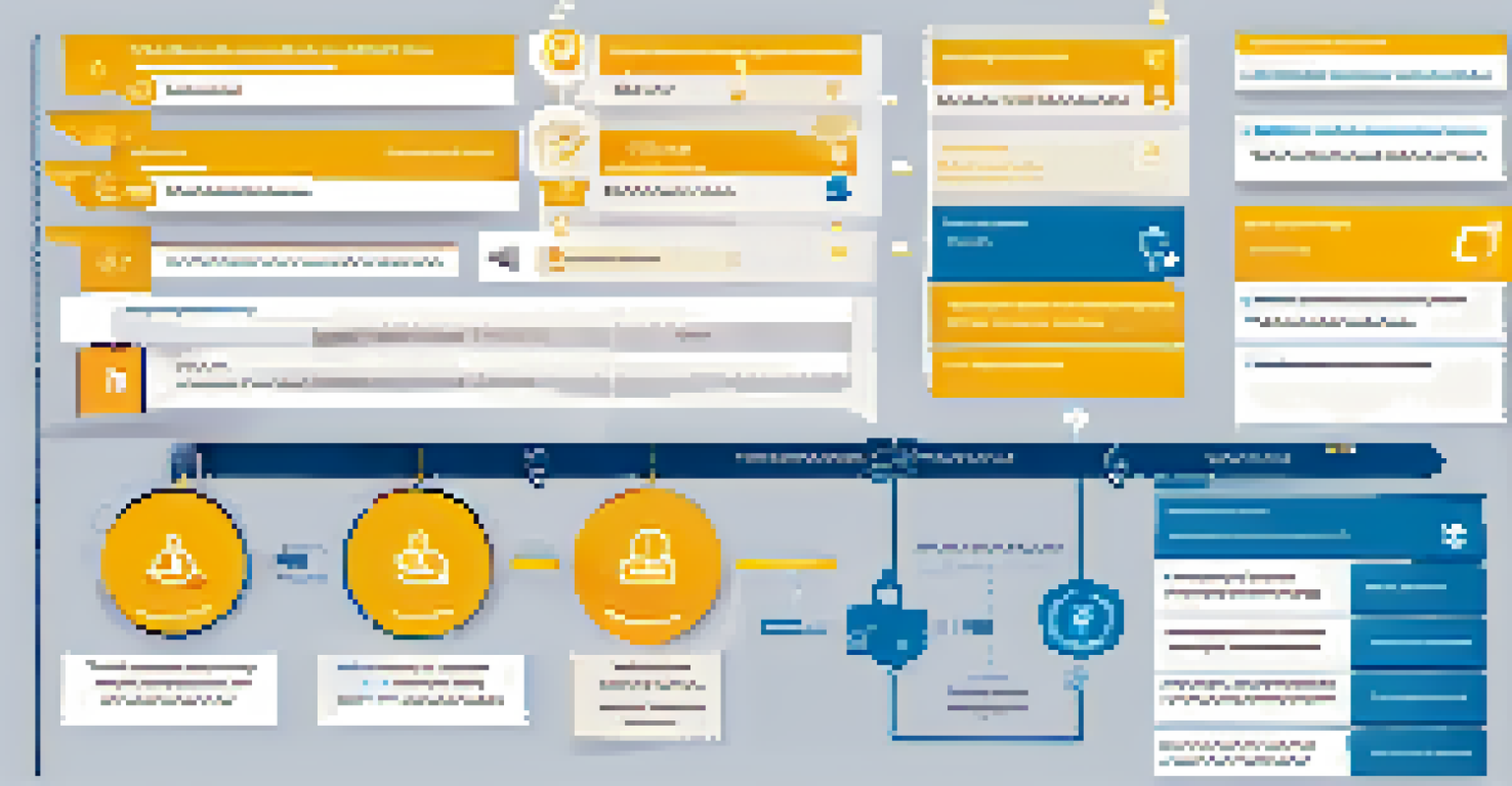Global Regulatory Landscape Affecting Ethereum Development

Understanding Ethereum's Regulatory Challenges Worldwide
Ethereum, as a leading blockchain platform, faces a myriad of regulatory challenges globally. Different countries are taking varied approaches, which can create uncertainty for developers. For instance, while some nations embrace cryptocurrencies, others impose strict regulations or outright bans. This divergence in regulations can affect everything from project funding to the legal status of tokens created on the Ethereum network.
The blockchain does not just represent a new way of doing business; it represents a new way of thinking about ownership, value, and trust.
It's essential for developers to stay informed about these regulations, as non-compliance could lead to severe penalties or project shutdowns. Countries like the United States and the European Union are actively drafting frameworks that could either promote or stifle innovation in the blockchain space. Developers must navigate these waters carefully, ensuring they align their projects with local laws.
Moreover, the evolving nature of regulations means that what's acceptable today may change tomorrow. This dynamic landscape necessitates continuous education and adaptation, making it crucial for Ethereum developers to engage with legal experts and regulatory bodies. By staying proactive, they can better position their projects for success in an unpredictable environment.
The Role of Financial Regulations in Ethereum Development
Financial regulations play a significant role in shaping how Ethereum projects operate, particularly those involving token sales and Initial Coin Offerings (ICOs). Many jurisdictions require projects to comply with anti-money laundering (AML) and know-your-customer (KYC) regulations. These requirements can add layers of complexity to fundraising efforts, making it essential for developers to understand their obligations.

For instance, in the United States, the Securities and Exchange Commission (SEC) has taken a firm stance on classifying certain tokens as securities. This classification can impose stringent reporting and compliance requirements on developers, impacting their project timelines and costs. The challenge lies in creating innovative solutions while adhering to these regulations, which can sometimes feel counterproductive.
Global Regulatory Challenges Ahead
Ethereum developers face diverse regulatory environments worldwide, impacting project funding and compliance.
However, navigating these financial regulations also opens doors for legitimacy and trust. By ensuring compliance, Ethereum projects can attract institutional investors who are increasingly looking for secure and regulated environments. This balance between innovation and compliance is a key factor that developers must consider to thrive in the Ethereum ecosystem.
Data Protection Laws and Their Impact on Ethereum Projects
As Ethereum continues to grow, data protection laws are becoming increasingly relevant for developers. Regulations like the General Data Protection Regulation (GDPR) in Europe impose strict guidelines on how personal data can be collected, stored, and processed. For Ethereum projects that handle user data, understanding and adhering to these laws is crucial to avoid hefty fines.
Regulation is not a bad word. It can be a powerful tool to foster innovation and protect consumers.
Incorporating data protection measures can also enhance user trust, which is vital for the success of any Ethereum-based application. Developers need to implement robust security practices and transparent data handling policies to ensure compliance with these regulations. This not only protects users but also positions projects as ethical and responsible within the blockchain space.
Moreover, the challenge lies in the decentralized nature of Ethereum, which can complicate compliance with traditional data protection laws. Developers must find innovative ways to align their decentralized applications (dApps) with these regulations, often requiring collaboration with legal experts to navigate the intricacies of the law.
Tax Implications for Ethereum Developers and Users
Tax regulations surrounding cryptocurrencies, including those built on Ethereum, can vary significantly from one jurisdiction to another. Some countries have clear guidelines on how to tax cryptocurrency transactions, while others are still developing their frameworks. For developers and users alike, understanding these tax implications is essential to avoid unexpected liabilities.
For instance, in the United States, the Internal Revenue Service (IRS) treats cryptocurrencies as property, meaning that every transaction could be subject to capital gains tax. This can complicate accounting for developers who are frequently interacting with Ethereum tokens. Keeping thorough records and understanding local tax obligations can help mitigate risks and ensure compliance.
Navigating Financial Regulations
Compliance with financial regulations, including AML and KYC, is crucial for Ethereum projects to build trust and attract investors.
On the flip side, a clear tax framework can encourage investment and innovation in the Ethereum space. When developers know what to expect regarding taxation, they can make more informed decisions about their projects and funding strategies. This clarity can help foster a more vibrant ecosystem that attracts both developers and investors.
Intellectual Property Rights in the Ethereum Ecosystem
Intellectual property (IP) rights are another crucial aspect of the regulatory landscape affecting Ethereum development. As developers create innovative solutions on the Ethereum platform, protecting their intellectual property becomes essential. Issues such as copyright, trademarks, and patents must be navigated carefully to safeguard proprietary technologies and ideas.
The decentralized nature of Ethereum presents unique challenges in this regard. For instance, while code can be open-source, the underlying concepts and designs may still be eligible for IP protection. Developers need to understand how to balance the open-source ethos of the blockchain community with the necessity of protecting their innovations from infringement.
Furthermore, as Ethereum projects grow and potentially attract investments or partnerships, having a solid IP strategy can enhance their value proposition. This is particularly important in a competitive market where differentiation is key. By effectively managing their intellectual property, developers can not only protect their creations but also create opportunities for collaboration and growth.
International Cooperation and Regulatory Harmonization
As the global regulatory landscape evolves, the need for international cooperation and regulatory harmonization becomes increasingly apparent. Different countries are approaching Ethereum and blockchain technology in various ways, leading to a patchwork of regulations that can be challenging for developers to navigate. Collaborative efforts between nations can help create a more cohesive framework that fosters innovation while ensuring compliance.
Organizations such as the Financial Action Task Force (FATF) are working towards establishing guidelines that promote consistency in cryptocurrency regulations worldwide. By aligning regulations, countries can create a more predictable environment for Ethereum developers, reducing the risks associated with cross-border projects. This can lead to a more robust and interconnected blockchain ecosystem.
Importance of Intellectual Property
Protecting intellectual property is essential for developers to safeguard innovations while fostering collaboration in the Ethereum ecosystem.
Moreover, international cooperation can also facilitate knowledge sharing and best practices, helping developers stay ahead of regulatory changes. By engaging in dialogue with regulatory bodies and industry leaders from different countries, Ethereum developers can better understand the global landscape and adapt their strategies accordingly.
The Future of Ethereum Development Amid Regulatory Changes
Looking ahead, the future of Ethereum development will undoubtedly be influenced by ongoing regulatory changes. As governments and regulatory bodies work to establish clearer frameworks, developers will need to remain agile and adaptable. This adaptability will be key to thriving in an environment where regulations can shift rapidly and unexpectedly.
Additionally, as Ethereum continues to gain mainstream adoption, the pressure for regulatory clarity will likely increase. Developers may find themselves at the forefront of discussions regarding best practices and compliance, advocating for frameworks that support innovation while addressing legitimate concerns. Engaging with regulators and policymakers will be essential for shaping a favorable environment.

Ultimately, the ability to balance innovation with regulation will determine the success of Ethereum projects. By embracing compliance as an integral part of their development strategy, Ethereum developers can pave the way for sustainable growth and contribute to the maturation of the blockchain industry as a whole.